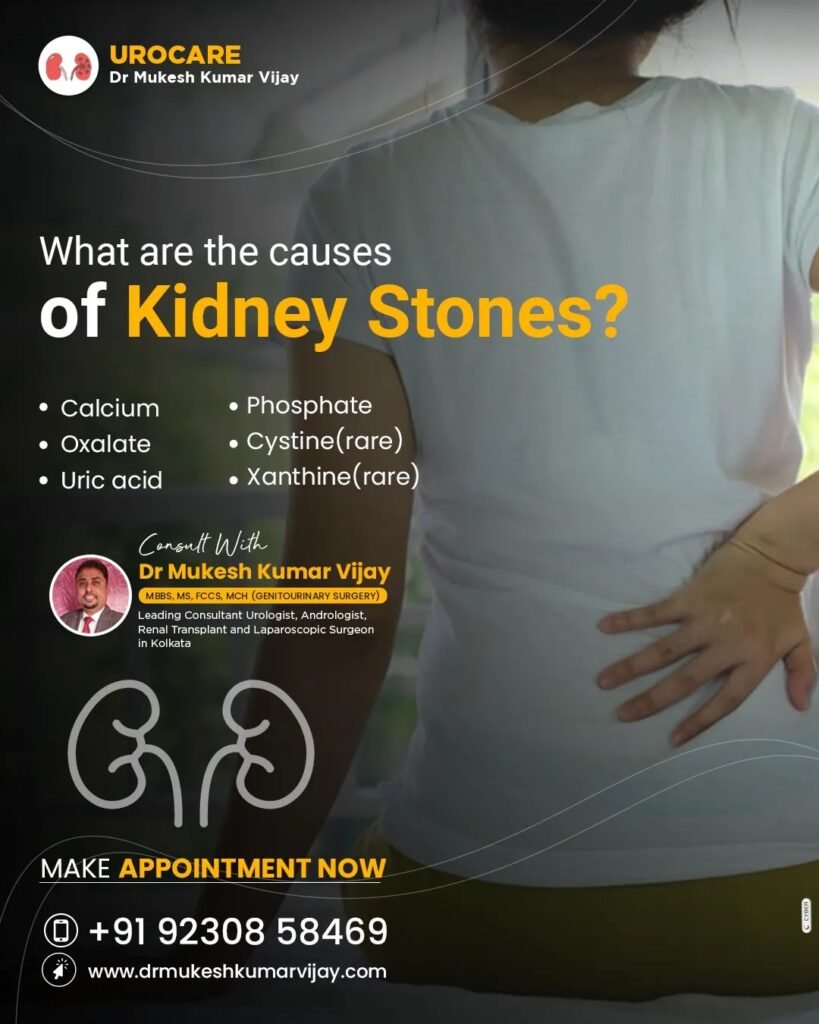
Kidney stones are a common yet painful condition affecting millions of people worldwide. These small, hard deposits can form in your kidneys due to various factors, leading to discomfort and serious complications if not treated in time. Understanding the causes of kidney stones is the first step toward prevention and proper treatment.
At Healcare, under the expert guidance of Dr. Mukesh Kumar Vijay, a leading Urologist and Kidney Specialist in Kolkata, you can get comprehensive care for kidney stone management, prevention, and treatment.
What Are Kidney Stones?
Kidney stones are solid crystal-like deposits that form in the kidneys when certain minerals and substances in the urine become concentrated. These stones can vary in size—from a grain of sand to a larger, painful mass. If left untreated, kidney stones can block the urinary tract, leading to extreme pain, infections, or even kidney damage.
Primary Causes of Kidney Stones
Several substances in urine can crystallize and form stones. These include:
- Calcium
- Calcium stones are the most common type of kidney stones.
- They form when calcium combines with other substances like oxalate or phosphate in urine.
- Causes include dehydration, excessive dietary calcium, or an overactive parathyroid gland.
- Oxalate
- Oxalates are naturally found in certain foods like spinach, nuts, chocolate, and tea.
- High oxalate levels can bind with calcium to form stones.
- Avoiding oxalate-rich foods or pairing them with calcium-rich diets can help minimize risk.
- Uric Acid
- Uric acid stones develop when urine becomes overly acidic.
- People who eat high-protein diets (meat, seafood) or are dehydrated are at higher risk.
- Gout and certain genetic conditions can also cause uric acid stones.
- Phosphate
- Phosphate stones are typically related to urinary tract infections (UTIs).
- These stones are also called struvite stones and can grow quickly, leading to complications.
- Cystine (Rare)
- Cystine stones form due to a rare genetic disorder called cystinuria, where excess cystine (an amino acid) leaks into the urine.
- These stones are relatively uncommon but can recur frequently in affected individuals.
- Xanthine (Rare)
- Xanthine stones form due to genetic disorders or the breakdown of purines.
- Though rare, xanthine stones require special monitoring and treatment.
Why Do Kidney Stones Form?
Several risk factors contribute to the development of kidney stones, including:
✅ Dehydration
Lack of sufficient water intake concentrates urine, allowing minerals to crystalize and form stones.
✅ Dietary Habits
- High intake of salt, sugar, protein, or oxalate-rich foods increases kidney stone risk.
- A low calcium diet may also contribute to stone formation, as calcium binds to oxalates.
✅ Obesity and Sedentary Lifestyle
Being overweight or inactive increases the likelihood of kidney stones due to metabolic imbalances.
✅ Family History and Genetics
A family history of kidney stones or genetic conditions like cystinuria significantly raises your risk.
✅ Medical Conditions
Conditions like gout, diabetes, hyperparathyroidism, and urinary tract infections can trigger stone formation.
✅ Medications and Supplements
Overuse of calcium supplements, antacids, or certain diuretics may increase calcium levels in urine.
Symptoms of Kidney Stones
Recognizing the symptoms of kidney stones is crucial for timely intervention. Common signs include:
- Severe pain in the lower back, abdomen, or groin
- Blood in urine (hematuria)
- Nausea and vomiting
- Frequent urination or a burning sensation during urination
- Fever and chills if an infection occurs
If you experience any of these symptoms, seek medical attention immediately.
Prevention of Kidney Stones
The good news is that kidney stones can often be prevented with healthy lifestyle changes. Here are some tips to keep your kidneys stone-free:
- Stay Hydrated
Drink at least 8-10 glasses of water daily to dilute urine and prevent crystal formation. - Maintain a Balanced Diet
- Limit salt, sugar, and animal proteins.
- Add kidney-friendly foods like citrus fruits, whole grains, and low-fat dairy.
- Monitor Calcium Intake
Don’t avoid calcium altogether. Instead, include calcium-rich foods like dairy while avoiding calcium supplements unless advised. - Limit Oxalate-Rich Foods
Reduce foods like spinach, rhubarb, and nuts if you’re prone to calcium oxalate stones. - Exercise Regularly
Stay active to maintain a healthy weight and reduce the risk of metabolic imbalances.
Why Choose Dr. Mukesh Kumar Vijay for Kidney Stone Treatment?
Dr. Mukesh Kumar Vijay is a trusted and highly experienced Consultant Urologist, Andrologist, and Laparoscopic Surgeon with over 25 years of expertise in treating kidney stones and related urological conditions.
- Expertise in Modern Treatments: From medical management to minimally invasive procedures like Laser Lithotripsy and PCNL, Dr. Vijay ensures effective and pain-free kidney stone removal.
- Proven Success: Over 25,000 successful surgeries and 200,000 satisfied patients speak for his commitment to excellence.
- Patient-Centered Approach: Dr. Vijay believes in personalized care, offering customized treatments based on individual needs.
Take the First Step Toward Pain-Free Living!
If you are experiencing kidney stone symptoms or want to learn more about prevention and treatment, don’t wait. Delaying treatment can lead to complications, including kidney infections and permanent damage.
📞 Make Your Appointment Today
- Phone: +91 92308 58469
- 🌐 Website: https://thehealcare.com/book-appointment/
Trust the expertise of Dr. Mukesh Kumar Vijay and take charge of your kidney health today!





